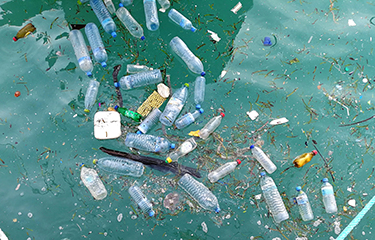Global efforts to reduce plastic waste are being foiled by a lack of transparency in the supply chain, according to a new report from the Perth, Australia-based non-profit philanthropic Minderoo Foundation and SYSTEMIQ, an organization dedicated to ensuring the United Nations Global Goals and the Paris Climate Agreement are upheld.
The report, “Clearing a Path Through the Waste: Transparency in the Plastics Supply Chain,” points out that current commitments by governments and industries to tackle the issue are too narrow in scope and scale, and mostly focus on countries with lower amounts of plastic pollution. The report identifies six high-priority transparency issues, and turns them into a comprehensive roadmap for action.
Billions of dollars are spent on the effort to stem the flow of more than one million metric tons (MT) of plastic into rivers and oceans each month, but these efforts do little to tackle their source.
“The report is an opening salvo. It shows that the status quo is not good enough, that we need to see progress right across the supply chain, and that a commitment is needed by all players to tackle the growing issue of plastic pollution in the ocean,” Minderoo Foundation Director of Finance and Transparency Dominic Charles told SeafoodSource.
Global efforts to change industry practices, include producing less plastic from virgin feedstock, collecting more plastic waste, and increasing recycling, do exist. However, a lack of data, information, and intelligence means that these efforts fall short of their expectations and potential.
A recent study showed that on the current trajectory, plastic pollution will rise from 11 million MT to 29 million MT in just 20 years. It also found that by using existing technologies, industry and governments could work together to reduce ocean plastic flows by 80 percent in the same timeframe.
“This will not be easy. We need to start from a place of radical transparency across the supply chain – from petrochemical suppliers and producers, to retailers and recyclers. This report provides the basis from which business and government can take effective decisions and actions to end ocean plastic pollution in a generation,” SYSTEMIQ Founder and Managing Partner Martin Stuchtey said.
Estimates suggest that plastic waste costs the world more than USD 2.2 trillion (EUR 1.8 trillion) each year in terms of environmental and social damage. This enormous cost to humanity led the Minderoo Foundation to form its “Sea the Future” initiative, which encourages the plastics supply chain to leverage their ability to change the way the world uses and wastes plastic.
According to the report’s authors, the lack of data information and knowledge about the flow of materials from production to disposal, how virgin plastics production is funded, and the responsibilities, strategies, and commitments of stakeholders leads to a misallocation of resources and ineffective actions.
“Business-as-usual is a terrifying thought, and the lack of transparency means we don’t know if individual efforts are making a difference," Charles said. "Also, companies and investors do not know the extent to which they are exposed to economic, legal, and reputational risks from plastic pollution. By setting out a roadmap for improvement, the report lays the groundwork for all actors to make better decisions."
Charles said a major aim was to achieve an end of leakage of plastics into the environment and to see a reduction of 50 percent in circulatory by the end of the decade.
The report uses case studies to demonstrate where measures have been effective in tackling the six main issues in the supply chain. It also suggests three approaches to achieving greater transparency:
- Voluntary disclosure by the plastics industry, encouraged by investors, with technical support from industry organizations and non-governmental organizations, where a toolbox of standards, methodologies and disclosure frameworks can bring consistent and comparable data into the public domain.
- Regulated disclosure by governments and policymakers to set, clarify and enforce legal requirements to report on plastics use, impacts, and mitigation strategies.
- Outside-in reporting by academia and shadow reporting by civil society campaigners, to raise the level of awareness of the issue and the measures being taken to improve it, such as tracking plastic leakage to the ocean using novel research and data collection.
The report adds a warning that none of the three approaches can be implemented in isolation, but need a joint commitment from industry, investors, regulators, and society.
“There are examples of good practice,” Charles said. “Germany, for example, introduced a new Packaging Act in 2019 and has a central packaging registry, which collects data on how plastic is used and consumed, but this level of reporting is inconsistent across the globe.”
Photo courtesy of Mr.anaket/Shutterstock







